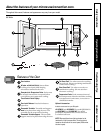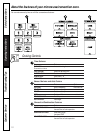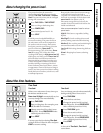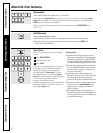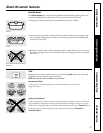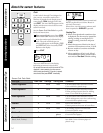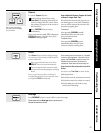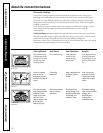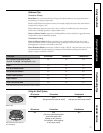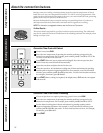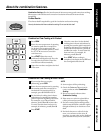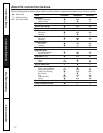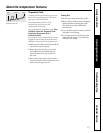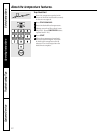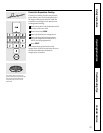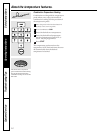
Customer ServiceTroubleshooting TipsOperating InstructionsSafety Instructions
17
Cookware Tips
Convection Cooking
Metal Pans are recommended for all types of baked products, but especially where
browning or crusting is important.
Dark or dull finish metal pans are best for breads and pies because they absorb heat
and produce crisper crust.
Shiny aluminum pans are better for cakes, cookies or muffins because these pans
reflect heat and help produce a light tender crust.
Glass or Glass–Ceramic casserole or baking dishes are best suited for egg and cheese
recipes due to the cleanability of glass.
Combination Cooking
Glass or Glass–Ceramic baking containers are recommended. Be sure not to use
items with metal trim as it may cause arcing (sparking) with oven wall or oven shelf,
damaging the cookware, the shelf or the oven.
Heat–Resistant Plastic microwave cookware (safe to 450°F.) may be used, but it is not
recommended for foods requiring crusting or all-around browning, because the
plastic is a poor conductor of heat.
Cookware Microwave Convection Combination
Heat-Resistant Glass,Glass-Ceramic
Yes Yes Yes
(Pyrex
®
, Fire King
®
, Corning Ware
®
, etc.)
Metal
No Yes No
Non Heat-Resistant Glass
No No No
Microwave-Safe Plastics
Yes No Yes
❆
Plastic Films and Wraps
Yes No No
Paper Products
Yes No No
Straw, Wicker and Wood
Yes No No
❊
Use only microwave cookware that is safe to 450°F.
Using the Shelf System
Microwave Convection Combination
No Yes Yes
(always use the shorter shelf) (always use the shorter shelf)
Microwave Convection Combination
No Yes No
(the two-level shelf system
should be used when
baking on two levels—
for example, when baking
a two-layer cake)
Shorter shelf
Taller shelf with shorter shelf for
two-level baking.



